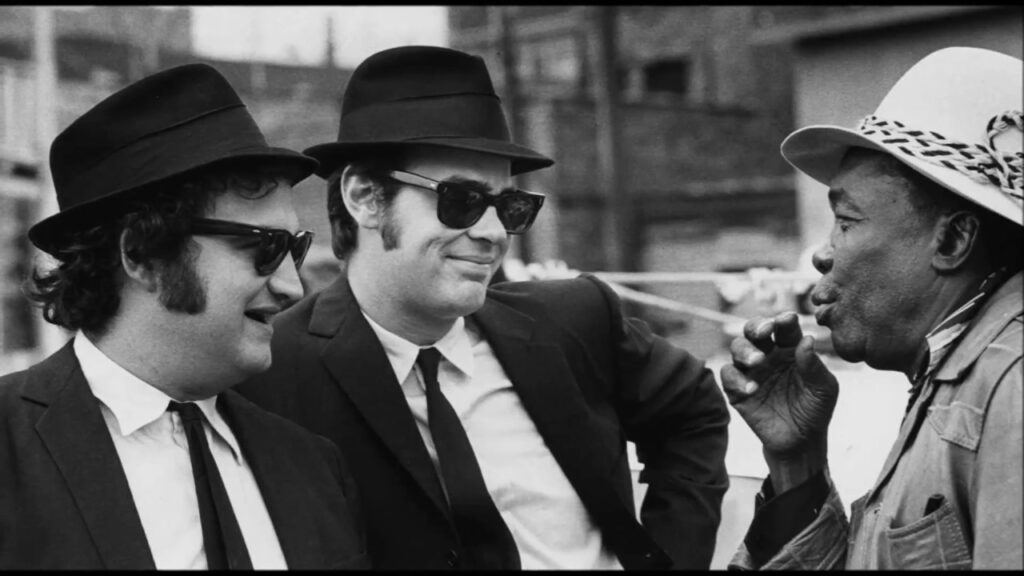Twenty years after his death, it is an exceptional day to remember John Lee Hooker, a blues guitar legend and King of the Boogie (August 22, 1917 – June 21, 2001). For fans like me, he first emerged on to my radar because of his appearance in the 1980 movie “Blues Brothers” with Dan Aykroyd and John Belushi.
In respectful memory, enjoy a few excerpts from Charles Shaar Murray’s “Boogie Man: The Adventures of John Lee Hooker in the American Twentieth Century” in 2000.
• “Slouched in his chair and protected by his shades, Hooker works through his tales of lust and anger, sorrow and loneliness, regret and despair. They call certain kinds of blues ‘low down,’ and sometimes what is meant by that is a social judgment on certain sorts of people and certain sorts of lifestyle. In Hooker’s case, ‘low down’ is a barometer reading of the emotional depths. This is as bad as it gets. Oh, the details may vary. He ain’t got no money. He ain’t got no place to go. He wants her. She don’t want him. She wants him. He don’t want her. But into each scenario, the grain of his voice breathes verisimilitude – I been there – and compassion – it hurts, I know it – and the sheer fact of his presence seemingly guarantees that, just as he survived it all, so will we. The inevitable climax is the joyful catharsis of his trademark boogie. It is for this moment that he goes to such extreme lengths to conserve his energy: that electrifying instant when he casts his guitar aside, tears off his shades, leaps to his feet and prowls the stage, all frailty or fatigue forgotten, exhorting both band and audience to greater effort. From the bluesman, arm-wrestling his pain and the world’s on a Delta front porch or in a rat-infested ghetto apartment, he is transformed into the preacher, who cajoles and bullies us toward salvation.”
• “This is what Hooker calls ‘preachin’ the blues,’ though his storefront pulpit is the neighborhood bar – or, more recently, the recording studio and the concert hall. Over that single hammering riff that he learned from his stepfather some six or so decades before, he orchestrates the celebration of this fact: that all present have triumphed over current adversities simply by finding this one moment – here, now – of solidarity and joy. If anything can truly be said to be the philosophical core of the blues, it is this: when you suffer, you can at least boogie, and when you boogiein’, you ain’t sufferin’. But, first, you got to face the fact that you’re sufferin’. Once you’ve acknowledged your pain, you can get to dealing with it. … the blues is not about feeling bad, but about feeling good despite every factor in the world which conspires to make you feel bad.”
• “Behind all of the idiosyncrasies of taste and style, behind all the stagecraft and devices which any long-term performer develops, behind the songs and the riffs and the schtick and the musicianship, is the bluesman’s true role: that of our confidant. The bluesman hasn’t heard our personal, individual story – not unless he’s a close personal friend, that is – but he should make us feel that he knows it anyway, that he has heard us and understands us. By telling his story – or a variation of his story, or several variations of his story, or even an outright embroidery of his story – John Lee Hooker enables us to face our own. In this sense, the bluesman is our confessor, our shrink; it is his job to forgive us and comfort us, shoulder our burdens as he invites us to help him shoulder his own. Against the forces of wickedness, the preacher is our leader; the general who marshals our forces; the conductor who orchestrates our instruments. But when the preacher’s mantle passes to the bluesman, it is so that he can enlist us in an epic battle against despair. When the bluesman hollers “Good mornin’, Mr. Blues” or tells us of blues walkin’ just like a man, he’s talking about what Winston Churchill called his “black dog”: the personification of despair. If he were a doctor, he would inject us with a small, controllable dose of that despair, an inoculation to protect us from ultimately succumbing to it. And it doesn’t matter who you are.”
• “John Lee Hooker was born and raised in the church. Indeed, his earliest and most formative musical, cultural and spiritual experiences came from the church, and from the preaching of his father, the Rev. William Hooker. He is, as it happens, not only the Son Of A Preacher Man, but also the brother of another, and the father of another still.”
• “[T]he climax of Hooker’s stage act irresistibly evokes the transcendent fervor of charismatic Southern Baptism, wherein preacher and congregation alike are caught up in the ecstatic whirlwind of the descending spirit. In conventional Western religious services, the congregation are there to worship under the direction of their pastor, but the African-American ceremony goes further. It is rooted in the tradition of a fundamental, primal encounter with the powers that drive the universe, in which the participants invite transcendence, offering themselves up to the spirit they invoke in the knowledge that their offer will be, at least for the duration, accepted. It is about more than merely worshiping: it is about becoming, and about temporarily ceasing to be.”

